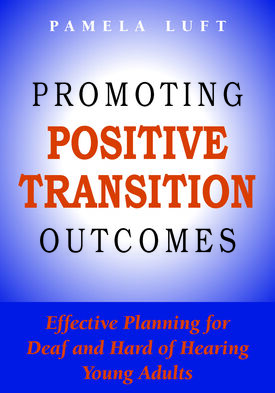
Promoting Positive Transition Outcomes
Effective Planning for Deaf and Hard of Hearing Young Adults
Promoting Positive Transition Outcomes is the most comprehensive discussion of transition planning and results for DHH students now available. Luft provides an overview of the challenges to DHH students and their academic and vocational potential. She explores the importance of forming an identity and building foundational social and problem-solving skills. She examines the services that are currently available in high schools and offers recommendations for strengthening transition team planning by reaching out to external experts. The volume concludes with suggestions for creating a framework to address the challenges of transition planning and offers guidance on building effective plans.
Description
Many students struggle with the transition from high school to the next stage of their lives. For deaf and hard of hearing (DHH) students, that struggle can be intensified by barriers and discriminatory attitudes they face in their communities, schools, and workplaces. Though much progress has been made, they are often underemployed and underpaid, and they receive postsecondary training at lower rates than other disability groups. Author Pamela Luft explores the reasons for these statistics and offers strategies and resources that can improve outcomes.
Promoting Positive Transition Outcomes is the most comprehensive discussion of transition planning and results for DHH students now available. Luft begins with an overview of the historical and current challenges to DHH students and their academic and vocational potential. She explores the importance of forming an identity and building foundational social and problem-solving skills. She then reviews the history of rehabilitation and workforce legislation, which now mandates that every student with an individualized education plan (IEP) have a transition plan in place by the age of 16. Most schools, however, are not equipped to meet the needs of a population as diverse as DHH students. She examines the services that are currently available in high schools and offers recommendations for strengthening transition team planning by reaching out to external experts. The volume concludes with suggestions for creating a framework to address the challenges of transition planning for deaf and hard of hearing students and offers guidance on building effective plans.
Pamela Luft is an associate professor of special education (deaf education and moderate/severe disabilities) at Kent State University.
Reviews
"In Promoting Positive Transition Outcomes, Pamela Luft presents information and resources that fill in many of the gaps experienced by transition specialists who work with students and youth who are deaf or hard of hearing (D/HH)...This book provides a comprehensive approach to transition planning and will appeal to variety of stakeholder groups, including educators, vocational rehabilitation counselors, parents, personnel preparation faculty, and related community agency service providers."
— Journal of Deaf Studies and Deaf Education
"As someone who has been a recipient of transition services and IEP meetings, as well as having studied rehabilitation counseling, owned and operated a job placement service, and participated in transition team meetings, I can say with confidence that Luft covers many of the essential issues that arise when providing transition services. I am impressed with the breadth of knowledge that Luft puts forth in this book and how she incorporates a very comprehensive base of research evidence to inform her book. Further, as a Deaf individual myself, I think it is crucial to touch upon a point that Luft honors: recognizing the importance of certain core cultural values of the Deaf community, and how these values drive their effort for advancement in a society that has long ignored, neglected or simply prevented their right for equality in education, employment and civil rights."
— Bentley Fink, University of Texas, Austin, Journal of Postsecondary Education and Disability